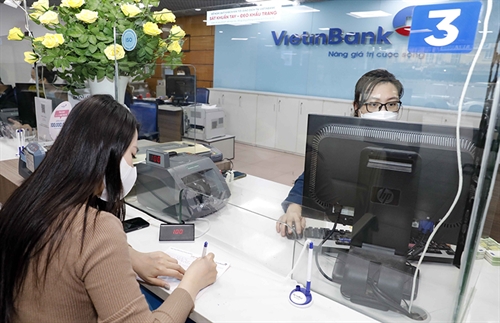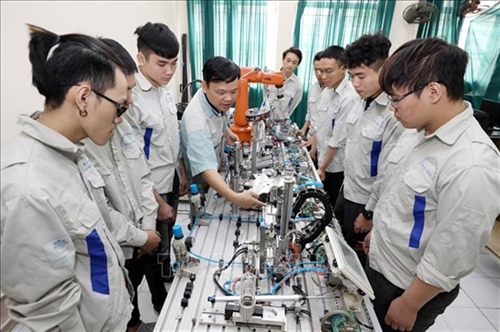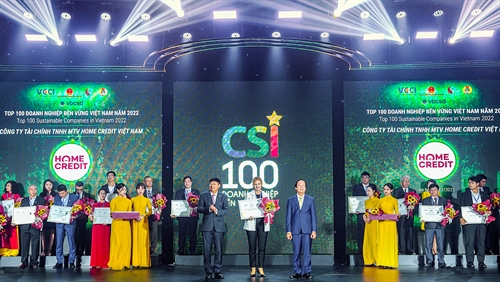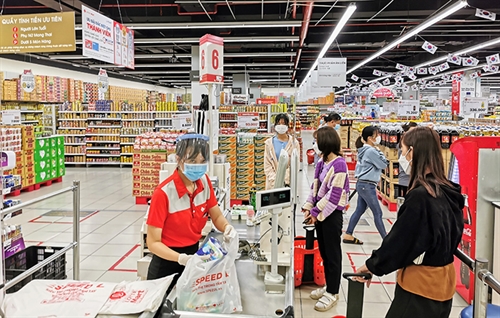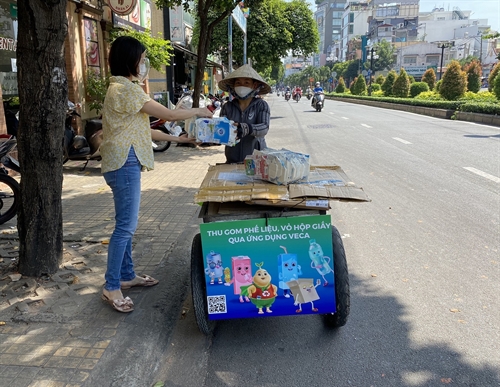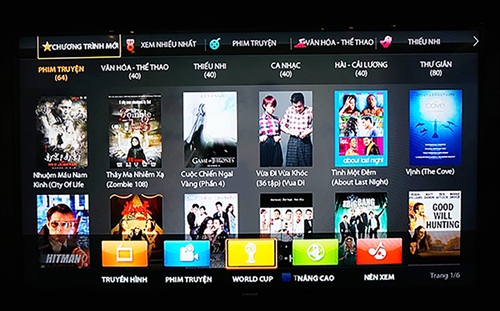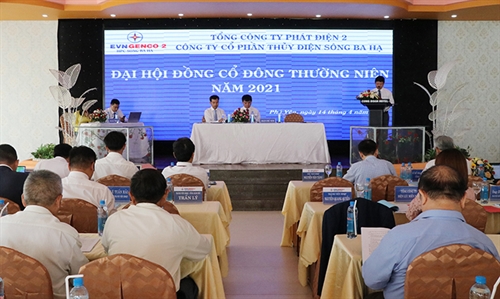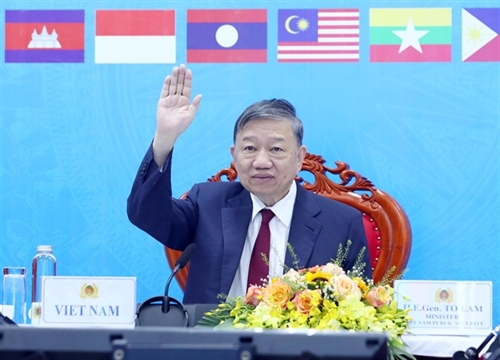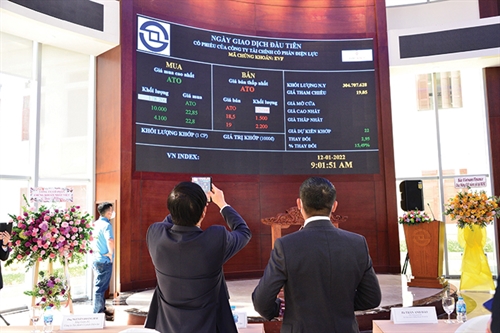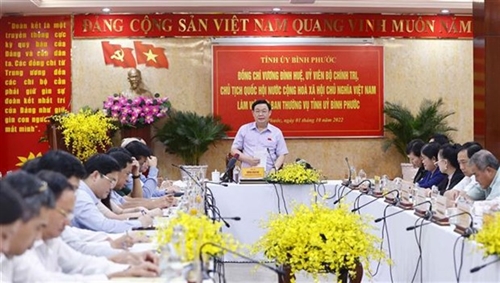In order to perpetuate the country’s positive results recorded in 2022 amid multiple headwinds facing the global economy, the Government recently issued Resolution 01/NQ-CP, specifying major tasks and providing important solutions to implement the 2023 socio-economic development plan and improve the domestic business environment and national competitiveness.
 |
Producing shoes for export to the EU market in Ha Tay Chemical Textile Co. Ltd., Hanoi __Photo: Tran Viet/VNA |
| Producing shoes for export to the EU market in Ha Tay Chemical Textile Co. Ltd., Hanoi __Photo: Tran Viet/VNA |
Per-capita GDP projected to reach USD 4,400
As reviewed in the Resolution, the year of 2022 was another year of global economic recession entailed by the COVID-19 pandemic, which put a great pressure on the country’s macro-economic management and affected the resilience and development of majority of sectors and fields, as well as the people’s livelihood.
Against all the odds, the national socio-economic development saw a positive recovery and achieved important results, with 13 out of 15 set targets achieved or exceeded, the average consumer price index (CPI) increase rate kept at 3.15 percent, GDP growth rate reaching 8.02 percent, the highest in the 2011-22 period, and state budget revenues surpassing by 27.76 percent the estimates.
The Resolution goes on to say that the global situation will continue to be complicated with unpredictable developments this year, which will pose more challenges than ever to the country. Yet, there are opportunities lying ahead.
In light of this, the Government requests authorities, sectors and localities at all levels to determine to overcome all difficulties by maintaining solidarity, self-reliance, adaptability, flexibility, and drastic, rational and effective action, and to promote innovation to achieve the goals and tasks set under the 2023 socio-economic development plan.
Specifically, it is targeted that the GDP growth rate will reach 6.5 percent, per-capita GDP will be around USD 4,400, average CPI increase rate will be kept at 4.5 percent, poverty reduction rate according to the multi-dimensional poverty line will be 1-1.5 percent, and rate of population covered by health insurance will reach 93.2 percent.
To achieve the above targets, the Resolution sets forth 11 major tasks and solutions to implement the socio-economic development plan and state budget estimates and improve the business environment and national competitiveness this year, as listed below:
(i) Striving to maintain the macroeconomic stability, curb inflation, boost growth, and ensure the major balances of the economy;
(ii) Continuing to focus on disease prevention and control activities;
(iii) Intensifying the building and improvement of legal institutions and improvement of efficiency and effectiveness of the organization of law implementation; and corruption, negative practice and waste prevention and fight;
(iv) Further stepping up administrative reform in association with building of the e-government and digital government; improving the business environment and national competitiveness;
(v) Accelerating the practical and effective economic restructuring associated with renewal of the growth model, improving productivity, quality, efficiency, competitiveness, independence, autonomy, adaptability and resilience of the economy;
(vi) Focusing on synchronous development and improvement of the strategic infrastructure system, particularly transport infrastructure, climate-resilient infrastructure, and digital infrastructure; concentrating efforts on environmental protection and effective management and use of land and other resources;
(vii) Attaching importance to developing human resources, particularly high-quality human resources in association with intensifying science and technology research, development and application, and promoting innovation and startups;
(viii) Focusing on comprehensive and synchronous development of cultural fields, ensuring the harmony between economic development and cultural and social affairs development;
(ix) Improving the people’s living standards, ensuring social welfare, and maintaining the independence, sovereignty, unity, territorial integrity, national defense and security, political stability, and social order and safety;
(x) Carrying out external activities and international integration in a synchronous, comprehensive and effective manner, maintaining an environment of peace and stability for national development and raising Vietnam’s profile and prestige in the international arena; and,
(xi) Strengthening the information and communications work, and improving the effectiveness of the mass mobilization so as to create social consensus.
Under the Resolution, ministries, sectors and localities are tasked to actively monitor domestic and international developments, and intensify analysis, evaluation and forecasting to work out timely, comprehensive and comprehensive solutions and make the best use of opportunities and favorable conditions for, and minimize negative impacts on, the economy, production and business activities of enterprises, and the people’s livelihood.
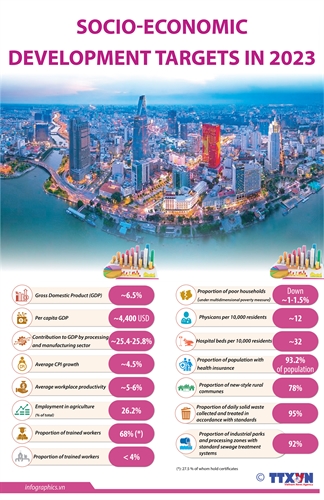 |
Specific tasks
In late January, the Prime Minister urged ministers, heads of ministerial-level agencies, and heads of local administrations and state economic groups and corporations to work out, and organize the implementation of, programs and plans of action and specific documents to implement the Resolution.
Under Directive 03/CT-TTg, the above persons are requested to perform tasks and implement solutions under the socio-economic recovery and development program and three national target programs in the 2021-25 period concerning socio-economic development in ethnic minority-inhabited and mountainous areas, building of a new-style countryside, and sustainable poverty reduction.
Their efforts will be concentrated on removing existing difficulties and shortcomings in production and business activities; and accelerating the implementation of large-scale and important schemes and projects with spillover effects, making positive contributions to the development of sectors, fields and the whole country; working out detailed plans on disbursement of all state budget investment funds; and speeding up the implementation of national important projects on transport infrastructure, inter-regional transport infrastructure and urban infrastructure, urban railway projects, and cultural and social affairs facilities.
Other tasks are to intensify the digital transformation, particularly projects on development of an application of population data and electronic authentication and identification aimed to serve the national digital transformation in the 2022-25 period, with a vision toward 2030; and to step up the administrative reform, especially for reducing business-related regulations, delegation of powers for settlement of administrative procedures, simplification of administrative procedures in the state administrative system, and application of the single-window mechanism, digitalization and internet-based platforms in the settlement of administrative procedures.
The cabinet leader assigns the Ministry of Planning and Investment to assume the prime responsibility for, and coordinate with ministries, agencies and localities in, keeping a close watch on, analyze and forecast socio-politico-economic developments around the world, particularly policies of big economies and global trends, as well as domestic situation so as to anticipate their impacts on the country for reporting to the Government for macroeconomic administration and direction.
Meanwhile, the Ministry of Finance is tasked to effectively perform the 2023 finance and state budget tasks, strictly manage state budget revenues, and create and efficiently use state budget revenue sources. It will coordinate with the Ministry of Industry and Trade and related agencies and localities in monitoring and strictly managing market prices, and intensifying the smuggling and trade fraud prevention and control.
The State Bank of Vietnam will continue to manage the monetary policy in a firm, proactive, flexible and effective manner, in harmony with the fiscal policies and other macro-economic policies, in order to stabilize the macro-economy, curb inflation, boost growth and ensure major balances of the economy. This also aims to create favorable conditions for the people and enterprises to get bank loans, contributing to restricting usury; and ensure security and safety for banking and credit activities, thereby protecting the lawful rights and interests of customers and related partners.
At the same time, the Ministry of Industry and Trade will be responsible for keeping its eye on market developments, product and goods supply and demand, particularly essential goods and petrol and oil, in order to promptly work out plans to balance supply and demand, thus avoiding supply chain disruption in any circumstances. It is also assigned to take advantage of market opening to boost export to traditional markets, potential markets in neighboring countries and countries with which Vietnam has signed free trade agreements.-
